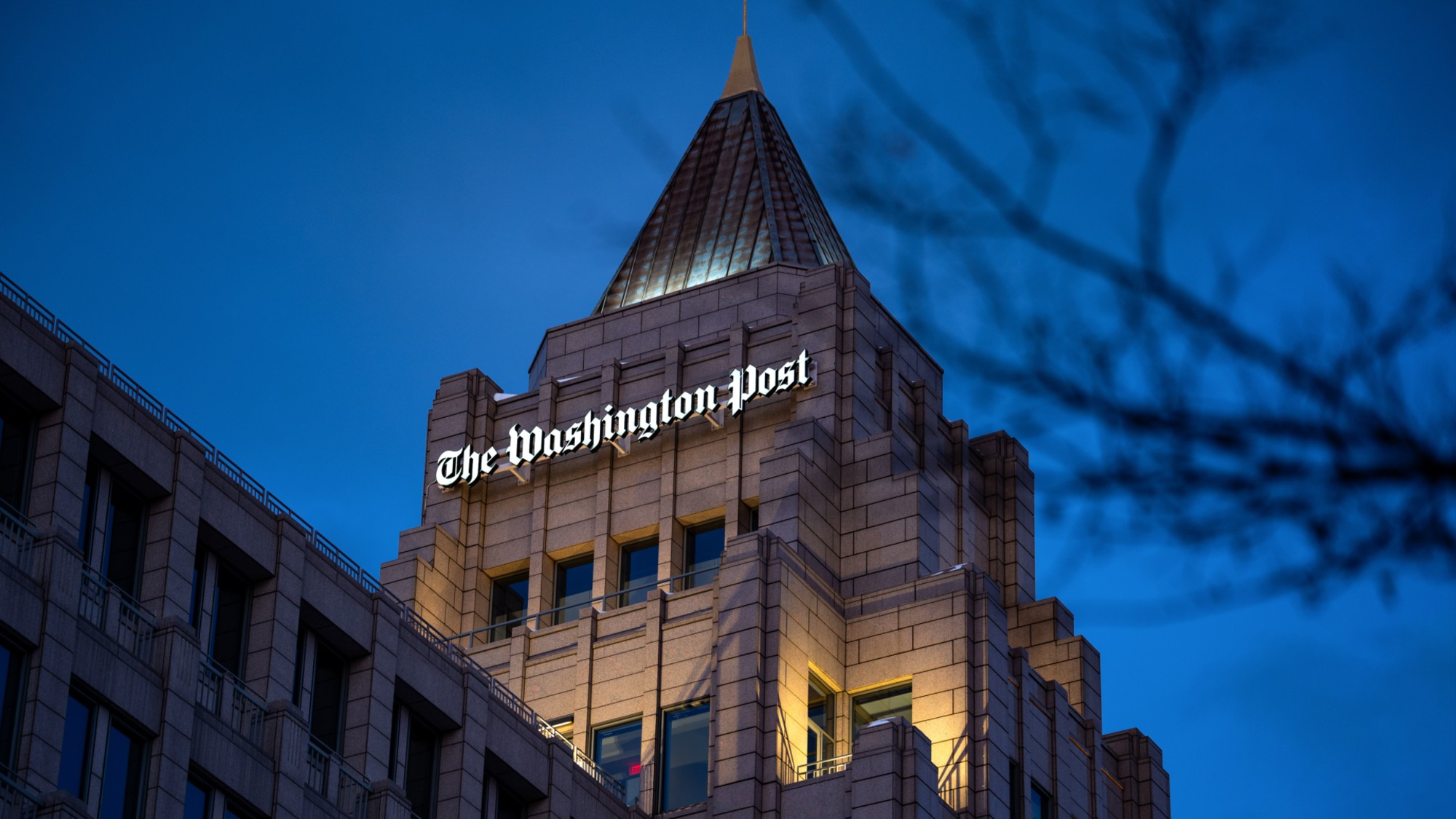The political-media complex is dying
A potential Biden-Trump rematch cannot seem to save it either


A free daily email with the biggest news stories of the day – and the best features from TheWeek.com
You are now subscribed
Your newsletter sign-up was successful
Election years in the United States are supposed to be the pinnacle of the political news landscape, a time when the eyes of the world are focused on the race for the White House. However, this election cycle seems to be generating a fresh reality: The relationship between news outlets and politicians, commonly referred to as the political-media complex, seems to be on the brink of collapse.
While hundreds of reporters would typically descend on Manchester, New Hampshire, for the state's Republican primary, the recent 2024 primary saw the city's DoubleTree Hotel nearly empty, media journalist Max Tani said in Semafor. The hotel usually "transforms itself into the bustling nerve center of the American news media," Tani said, and rooms "sell out months in advance." But as a photo taken by Tani shows, the hotel was more akin to a ghost-town motel this year.
This anecdote could be chalked up to the media's assumption that former President Donald Trump would carry the state (as he did), but is it also a microcosm of a larger problem within the political-media complex?
The Week
Escape your echo chamber. Get the facts behind the news, plus analysis from multiple perspectives.

Sign up for The Week's Free Newsletters
From our morning news briefing to a weekly Good News Newsletter, get the best of The Week delivered directly to your inbox.
From our morning news briefing to a weekly Good News Newsletter, get the best of The Week delivered directly to your inbox.
What is happening with the political-media complex?
Plainly put, the political-media complex seems to be fizzling this year, at least when it comes to the various mediums. Television traffic ratings for the Iowa caucuses were "terrible," said Semafor. Figures cited by Deadline show that Fox News led prime-time coverage with 2.83 million viewers, followed by MSNBC with 1.15 million. These figures are both significantly lower than 2020, when Fox brought in 4.4 million viewers and MSNBC generated 2.5 million.
The worst ratings of the major cable networks belonged to CNN, which averaged just 688,000 viewers during the caucuses. This is a dramatic plunge for the network, which brought in 1.8 million in 2020. Notably, though, all three networks drew terrible ratings when it came to the key 25-54 demographic: Fox brought in just 402,000 viewers, while CNN generated 193,000 and MSNBC generated 142,000. And away from television, "traffic to political coverage on digital news sites is down compared to the 2020 and 2016 presidential primaries," Semafor said.
Not only is interest in political media appearing to wane, the media itself is shrinking. The majority of states "don't have a single reporter covering Washington on the ground anymore," the Columbia Journalism Review (CJR) said. After a series of recent layoffs at the Los Angeles Times, there are now just eight print reporters left covering Washington for the major newspapers in California. That is eight people "covering the entire federal government — for a state of 39 million people," said the CJR.
Why is this occurring?
The shift largely has to do with the evolution of news media in an increasingly polarized political system. "Fewer reporters are paying attention to their local lawmakers and the more mundane but really important things they do," reporter Michael McAuliff said to the CJR. Instead, most political reporters are "tasked with following the loudest and most controversial lawmakers. It means local readers don’t understand what their representatives do all day," he said. The result is less interest overall in political news.
A free daily email with the biggest news stories of the day – and the best features from TheWeek.com
National media networks also "[tend] to frame politics in America through the lens of the major conflicts between the two parties," Syracuse University professor Johanna Dunaway said to PBS. Because a large portion of Americans watch national news stations in favor of local coverage, "they often only get this sort of game-frame style coverage, that it's almost like sports reporting with Democrats on one side and Republicans on the other," Dunaway said.
Combined, this combination becomes "corrosive to democracy in many ways, some more obvious than others" and makes polarization worse, the CJR said. Without dedicated political reporters, most Americans get their information about politicians "from campaign ads or when they're on national news talking about partisan issues."
What's next?
Many in the media are "beginning to reckon with the reality that the 2024 race won't bring a 'Trump bump' to save ad budgets or bring back readers, listeners and viewers," Tani said in Semafor. Many of these news organizations have seemingly seen the writing on the wall and scaled back their coverage of the GOP primaries.
The landscape has left those covering politics in a bit of a dark spot. Tani said that he texted a well-known national reporter who had "broken some major stories on the 2024 primary" to ask if they were in New Hampshire.
"I am not," the reporter said. "What's the point?"
Justin Klawans has worked as a staff writer at The Week since 2022. He began his career covering local news before joining Newsweek as a breaking news reporter, where he wrote about politics, national and global affairs, business, crime, sports, film, television and other news. Justin has also freelanced for outlets including Collider and United Press International.
-
 What are the best investments for beginners?
What are the best investments for beginners?The Explainer Stocks and ETFs and bonds, oh my
-
 What to know before filing your own taxes for the first time
What to know before filing your own taxes for the first timethe explainer Tackle this financial milestone with confidence
-
 The biggest box office flops of the 21st century
The biggest box office flops of the 21st centuryin depth Unnecessary remakes and turgid, expensive CGI-fests highlight this list of these most notorious box-office losers
-
 The Washington Post is reshaping its newsroom by laying off hundreds
The Washington Post is reshaping its newsroom by laying off hundredsIn the Spotlight More than 300 journalists were reportedly let go
-
 Why is the Pentagon taking over the military’s independent newspaper?
Why is the Pentagon taking over the military’s independent newspaper?Today’s Big Question Stars and Stripes is published by the Defense Department but is editorially independent
-
 ‘Netflix needs to not just swallow HBO but also emulate it’
‘Netflix needs to not just swallow HBO but also emulate it’instant opinion Opinion, comment and editorials of the day
-
 Paramount fights Netflix for Warner as Trump hovers
Paramount fights Netflix for Warner as Trump hoversSpeed Read Paramount Skydance is seeking to undo Netflix’s purchase of Warner Bros. Discovery
-
 Rothermere’s Telegraph takeover: ‘a right-leaning media powerhouse’
Rothermere’s Telegraph takeover: ‘a right-leaning media powerhouse’Talking Point Deal gives Daily Mail and General Trust more than 50% of circulation in the UK newspaper market
-
 Can the BBC weather the impartiality storm?
Can the BBC weather the impartiality storm?Today's Big Question MPs’ questions failed to land any ‘killer blows’ to quell the ‘seismic outrage’ faced by the BBC
-
 Paramount, Comcast, Netflix bid for WBD
Paramount, Comcast, Netflix bid for WBDSpeed Read The outcome of this bidding war ‘could alter the trajectory of the entertainment business’
-
 How Bari Weiss could change CBS News
How Bari Weiss could change CBS NewsTalking Points Is the network trying to ‘appease’ the president?
